Workshops & Events
Workshops & Events
Courses, workshops and activities ran in affiliation with COBE Lab.
COBE Lab's workshops and seminars are open to all Aarhus University employees and will continue to welcome relevant events in the future. If you have an idea for a workshop or seminar, that need to be hosted, please contact lab management at cobelab@au.dk.
Our courses and workshops are primarily relevant to research in COBE Lab. The workshops circle around use of equipment and software, programming in Python and R, new technologies and the like.
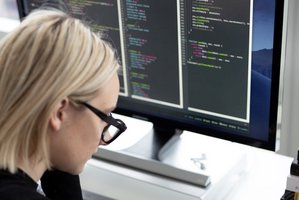
Carpentries Workshops
COBE Lab works with Center for Humanities Computing (CHCAA) at Aarhus University to organise and teach programming courses for researchers. The Carpentries develops and teaches in-person, interactive, hands-on, two-day workshops for learning core data science and coding skills. Carpentries workshops are taught by volunteer instructors, who focus on creating a motivating and engaging environment for learners. Keep an eye on Software Carpentries and CodeRefineries coming up.
Learn more about Carpentries here.
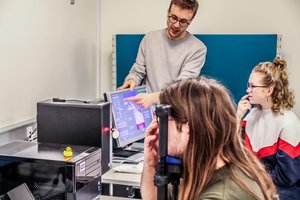
Equipment & Software Workshops
The aim of these workshops is to help you get familiar with relevant technologies and tools for your research. The workshops introduce you to software and/or equipment that are useful when designing behavioural experiments. This could be an introduction to using eye-tracking in research, designing interactive games in oTree software, demonstration of Virtual Reality equipment etc. The workshops are taught by internal researchers at Aarhus University or by external partners.
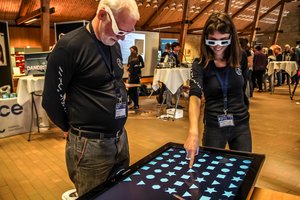
Outreach Activities
The aim of our outreach activities is to disseminate and showcase research to the public. COBE Lab supports our associated researchers by hosting events that enables public engagement in their research.
As an example COBE Lab attended the Danish Science festival with several demonstrations of experiments in Stakladen. Together with associated researchers we planned a program with engaging activities on human cognition and behaviour, and invited all associates to join us at the stand while we celebrated research and public engagement in science.
Eye tracking workshop, December 2019
This one-day workshop was intended for researchers working (or planning to work with) eye-tracking. Through a mix of theoretical lectures and hands-on exercises, the instructors provided participants with concrete tools for getting from their research idea to experimental design using eye-tracking.
Slides and literature from this workshop can be requested at cobelab@au.dk
Instructors:
Jacob Orquin, Professor, Department of Management
Fabio Trecca, Postdoc, School of Communication and Culture, Cognitive Science
Sonja Perkovic, Postdoc, Department of Management
Software Carpentry workshop, October 2019
Software Carpentry is a hands-on, two-day event that covers the core skills needed to be productive in a small research team. This particular workshop consists of three lessons: The Unix Shell, Version Control with Git, and Programming with R.
Software Carpentry focuses on teaching scientists to be more efficient by developing computer skills. It teaches researchers how to build, develop and share software. These skills provide a strong foundation to support designing experiments, coding basic experiments, collaborating with others on projects and coding effectively for data analysis.
Find the full programme here
Format
Two-day workshop
Instructors: Luke Johnston, Kristian Tylén, Dan Mønster, Mathias Wagner Barløse
Helpers: Oana Vuculescu, Sara Tomiolo, Maria Izabel Cavassim Alves, Petra Hermankova, Antonio Rivero Ostoic
BIOPAC System Nordic Seminar, September 2019
BIOPAC research systems are tools for physiology measurement. One of BIOPAC's presenters introduced the participants to EDA, ECG and Heart Rate Variability (stress measurements).
In this seminar participants learned about stress measurements such as EDA, ECG and HRV. The presenter provided participants with advice on how to record good data with EDA and ECG and how to go on with the data analysis. Participants has great opportunity to meet and discuss with representatives from BIOPAC and JoR, as well as other BIOPAC users in their area.
Databeskyttelse i Forskning, Marts 2019
COBE Lab afholdte i samarbejde med Aarhus Universitets Technology and Transfer Office (TTO) en workshop for forskere, som gerne ville opdateres om reglerne omkring databeskyttelse i relation til forskning. I første del af workshoppen blev de generelle ændringer og udviklinger, der er sket på databeskyttelsesområdet i løbet af det sidste års tid, gennemgået. I anden del blev der taget udgangspunkt i konkrete cases og problemstillinger fra Cognition and Behavior Lab, som der blev diskuteret løsninger til.
Virtual Reality Workshop, September 2018
Researchers had the opportunity to spend their afternoon in the virtual reality together with other associated researchers of COBE Lab. Carsten Bergenholtz, Bjarke Sandal and Jeppe Midjord demonstrated COBE Labs HTC Vive equipment and facilitated various experiences in virtual reality to give the researchers an idea and inspiration of the potential in virtual reality research.
Danish Science Festival, April 2018
Showcase your research, demonstrate equipment, conduct an experiment or give a speed lecture. COBE Lab attended the Danish Science festival with several demonstrations of experiments in Stakladen the 26th of April. We planned a program with engaging activities on human cognition and behaviour, and invited all associated researchers to join us at the stand while we celebrate research and support public engagement in science.
Watch a video from the event here.

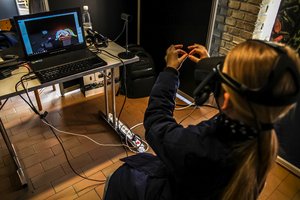
Persondata i forskningsprojekter, December 2017
Målgruppen
I workshoppen holder vi fokus på forskere, der arbejder med eksperimenter (intervention). Workshoppen vil blive afholdt på dansk.
Workshoppens indhold
I workshoppen vil jurister fra TTO på AU, introducere dig for de grundlæggende juridiske overvejelser, du bør gøre dig, når du arbejder med eksperimenter og samarbejder med eksterne såvel som interne forskere. Du vil bl.a. blive klogere på forskningssamarbejdskontrakter, den nye persondataforordning og arbejde med konkrete problemstillinger fra en forskers hverdag. Workshoppen afrundes af Ole B. Knudsen, informationssikkerhedschef på AU, der vil komme med retningslinjer til den praktiske håndtering af persondata.
På workshoppen gennemgås:
- Overblik over hovedpunkter i forskningssamarbejdskontrakter
- Overblik over persondataretlige regler ift. indsamling, behandling, registrering, opbevaring, anonymisering, videregivelse, overladelse mm.
- Udvalgte cases indsendt af workshopdeltagere
- Praktisk håndtering af persondata
Underviser
Jurister fra TTO, AU Forskning og Eksterne Relationer
Ole B. Knudsen, informationssikkerhedschef, AU IT
Materiale fra workshoppen
Slides fra Jasper Pingel og Susanne Kudsk kan hentes her
Slides fra Ole Boulund kan hentes her
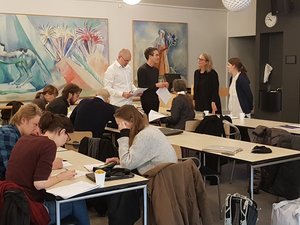
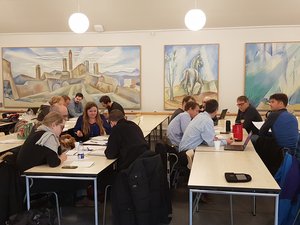
oTree Workshop, November 2017
Target audience: All associated researchers
In this workshop you will learn how to program simple and more complex games with oTree. oTree is an open-source and online software for creating interactive experiments in the laboratory and online. It does not require installation of software and can run on any device, that has a web browser. We will have one of the developers Chris Wickens coming to Aarhus University in person.
oTree lets you create:
- controlled behavioral experiments in economics, market research, psychology and related fields.
- Multiplayer strategy games, like the prisoners dilemma, public goods game and auctions
- Surveys and quizzes, especially those that require customized or dynamic functionality not available with conventional survey software
Format
One day workshop
Materials
Paper about oTree to download here
Slides to download here
CodeRefinery Workshop, October 2017
CodeRefinery is a hands-on informal and interactive three-day event with type-along type of presentations, live coding and demos. Short tutorials alternate with practical exercises.
The aim of the course is to demonstrate to and familiarize the workshop participants with best practices and tools in modern research software development. The main focus is on professional tools for efficiently developing and maintaining research software. Since most research is developed in a collaborative setting, we will discuss tools and workflows which facilitate this process. Most of the content is also relevant to a single developer.
Format
Three-day workshop
Instructors
Bjørn Lindi, research software engineer
Radovan Bast, senior engineer
Sabry Razick, senior engineer
Software Carpentry Workshop, October 2017
Software Carpentry is a hands-on, two-day event that covers the core skills needed to be productive in a small research team. This particular workshop consists of three lessons: The Unix Shell, Version Control with Git, and Programming with Python.
Software Carpentry focuses on teaching scientists to be more efficient by developing computer skills. It teaches researchers how to build, develop and share software. These skills provide a strong foundation to support designing experiments, coding basic experiments, collaborating with others on projects and coding effectively for data analysis.
Find the full programme here
Format
Two-day workshop
Instructors
Dan Mønster, associate professor, Department of Economics and Business Economics
Kristian Tylén, associate professor, School of Communication and Culture
Short Course on Experimental Methods in Social Science, February 2017
Target audience: PhD students and faculty from all disciplines
This course provides an introduction to experimental methods in social sciences and in particular in economics. We will discuss different types of experiments, reaching from classical laboratory experiments to class room, online and field experiments. This will be done with a focus on applications to, among others, market behaviour, social preferences, public policy, bounded rationality and biases in expectations. A focus will be on design that enables discrimination between different behavioural channels.
Format
3 days, with two 90 min lectures each day (10:00-12:00 and 13:00-15:00 on 1, 8 and 10 February)
Exam
All are welcome to attend the course. Those PhD students who want to obtain 3 ECTS points for the course should submit a worked out experimental design (max 10 pages), for a research question related to social sciences. The paper should be submitted 4 weeks after the course.
About the lecturer
Dirk Engelmann is an widely cited distinguished scholar in Experimental Economics. His research covers various topics, including social preferences, belief biases, auctions, and taxation. It has been published in leading journals such as the American Economic Review, Econometrica, The Economic Journal, Games and Economic Behavior. He is co-editor of the Journal of Economic Behavior and Organization and member of the editorial board of the American Economic Review and the Economic Journal.
Software Carpentry Workshop, August 2016
Software Carpentry is a reputable, voluntary organisation, focused on teaching scientists to be more efficient by developing computer skills. It teaches researchers how to build, develop and share software. This covers everything from experimental design, coding basic experiments, collaborating on projects with others and coding effectively for data analysis.
The Software Carpentry workshop will focus on:
- automating tasks using the Unix shell
- an introduction to structured programming in Python
- version control using Git
- SQL programming
Format
Two-day workshop
Instructors
Mateusz Kuzak
Christopher Mędrela
Tobii eye tracking seminar, June 2016
Nina Chrobot is a visiting scholar at Aarhus and consultant for Tobii Pro. On Monday 20 June at 13:00 in Lab 2m, Nina will present some of Tobii Pro's latest eye tracking equipment, including the Tobii Pro Glasses 2 and X2-30 models.
Format
The seminar will be informal and practical with ample time for discussion.